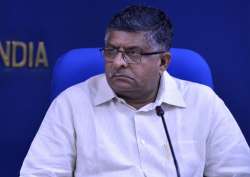Govt reacts to SC verdict, says ‘privacy a part of fundamental rights with reasonable restrictions’; lashes out at opposition
The nine judges unanimously overruled the two earlier judgements of the apex court that right to privacy is not protected under the Constitution. The bench overruled the M P Sharma verdict of 1954 and that of Kharak Singh of 1962.

The Centre today welcomed the Supreme Court ruling that right to privacy is an intrinsic part of Right to Life and Personal Liberty under Article 21 and entire Part III of the Constitution.
Addressing the media here, Union Law and Justice Minister Ravi Shankar Prasad strongly defended the government’s stand on the contentious matter and lashed out at the members of opposition parties for training guns at the ruling dispensation.
“The Supreme Court has affirmed what government had said in Parliament while moving Aadhaar Bill,” he said.
“Government welcomes judgement. Govt has been of view, particularly with regard to Aadhar that Right To Privacy should be Fundamental Right. On behalf of Government of India, Attorney General also argued that Right To Privacy is a part of Fundamental Rights with reasonable restrictions,” the Union Minister said.
As it happened: SC says Right to Privacy a fundamental right; govt welcomes verdict
Advising opposition to read the judgement copy before commenting on the issue, he said, “Since morning Congress is targeting us and Left has also joined them. What is the Congress' record of protecting individual liberty?”
Earlier in the day, the apex court had declared that right to privacy was a Fundamental right under the Constitution. A nine-judge Constitution bench headed by Chief Justice JS Khehar ruled that "right to privacy is an intrinsic part of Right to Life and Personal Liberty under Article 21 and entire Part III of the Constitution".
The ruling on the highly contentious issue was to deal with a batch of petitions challenging the Centre's move to make Aadhaar mandatory for availing the benefits of various social welfare schemes.
Right to Privacy: Chronology of SC hearings
While the Centre had argued that right to privacy is not a fundamental right, the petitioners had contended that when a citizen gives his biometrics and personal details to the government and when in turn it is used by commercial organisations, it is a breach of privacy.
The judgement was limited to the issue of right to privacy and the question whether Aadhaar violates right to privacy will be dealt with the five-judge bench which has been hearing the petitions since 2015.
The nine judges unanimously overruled the two earlier judgements of the apex court that right to privacy is not protected under the Constitution. The bench overruled the M P Sharma verdict of 1954 and that of Kharak Singh of 1962.

